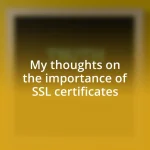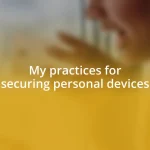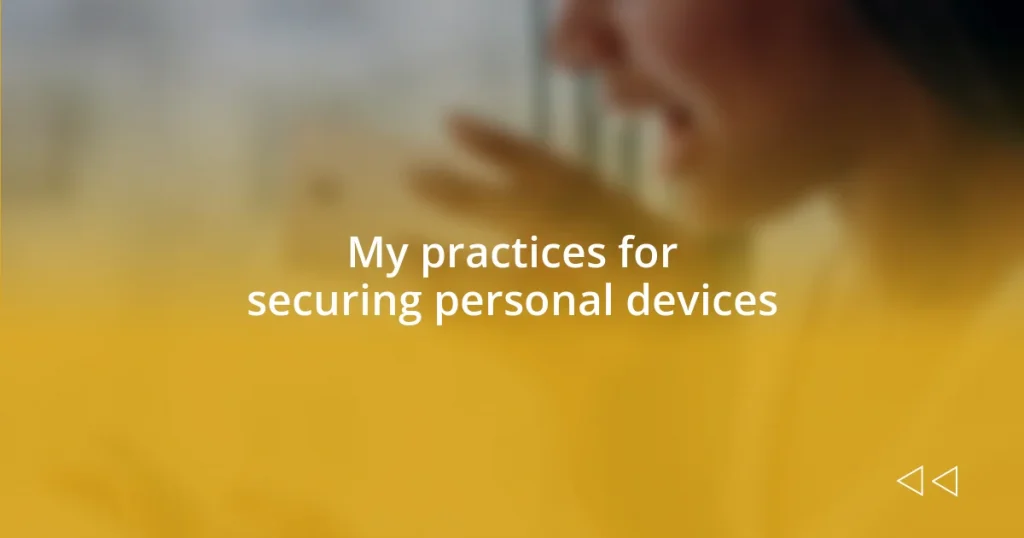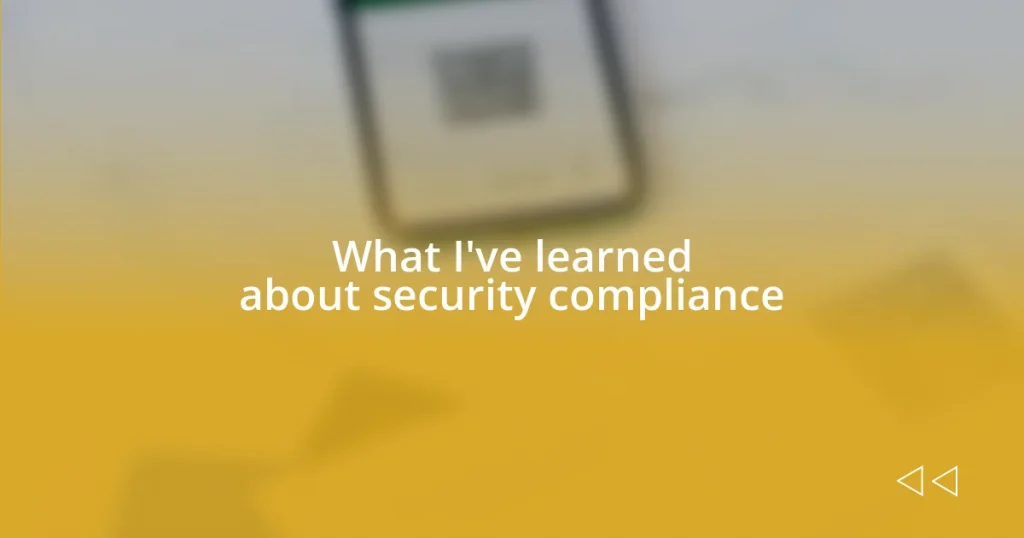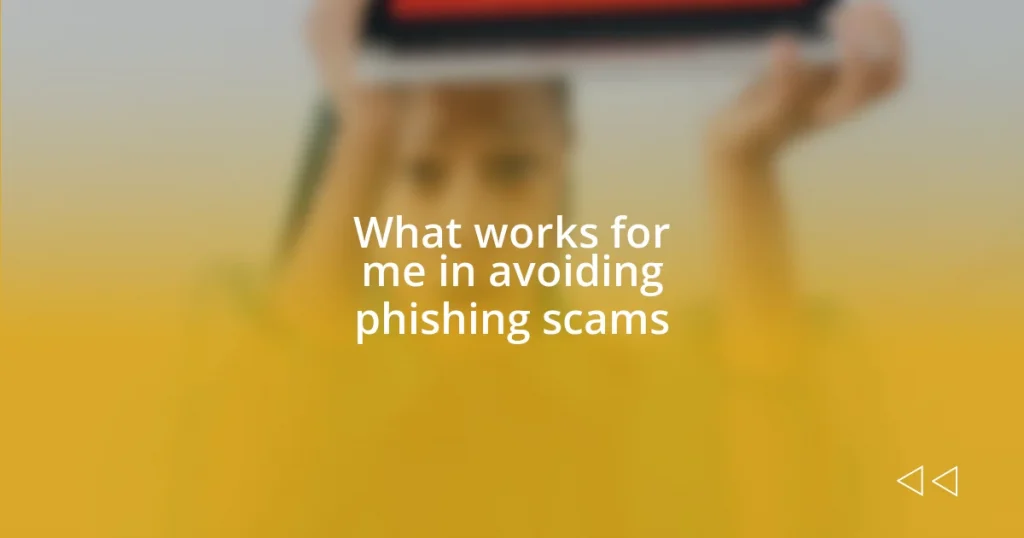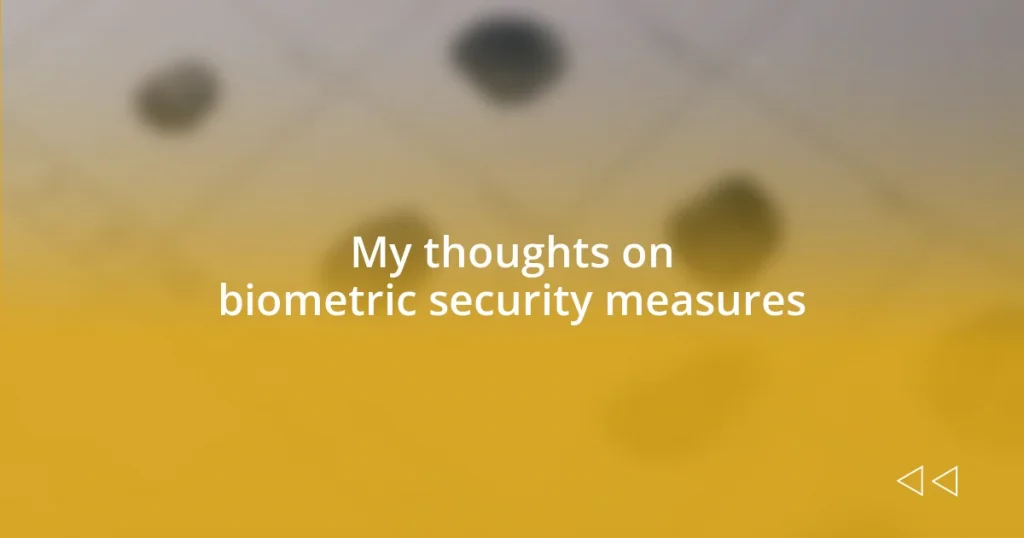Key takeaways:
- Strong passwords are essential as they serve as the first line of defense against unauthorized access and cyber attacks.
- Implementing Two-Factor Authentication (2FA) significantly enhances account security, adding an extra layer of protection beyond just passwords.
- Regularly backing up data and being aware of phishing threats are crucial practices that help safeguard personal information and prevent data loss.
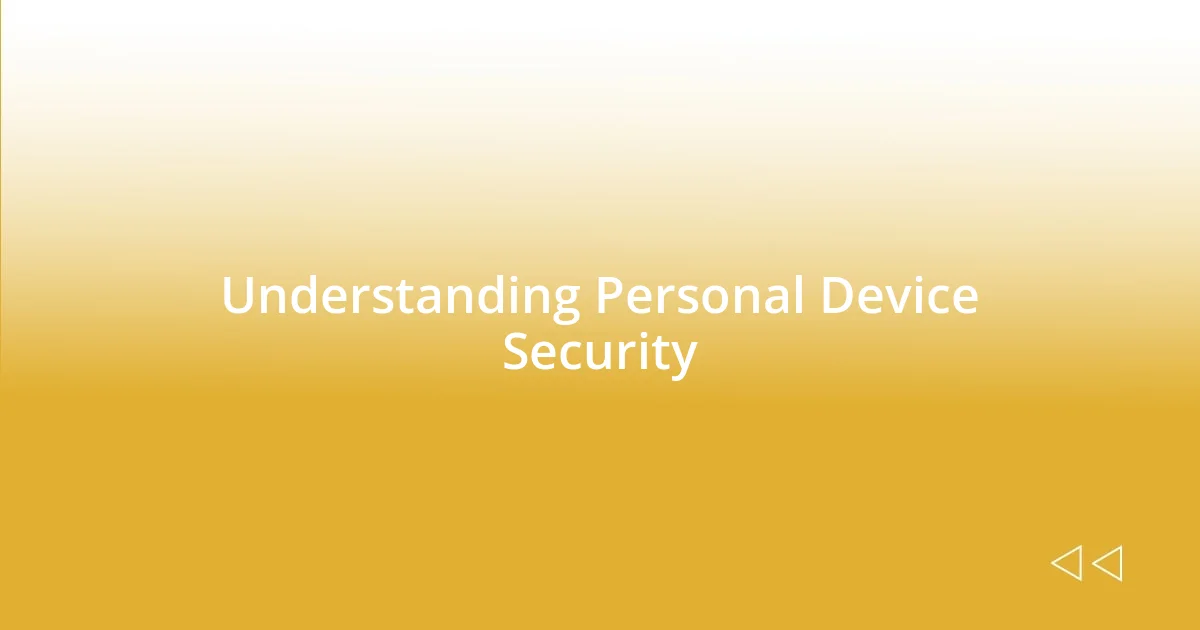
Understanding Personal Device Security
Understanding personal device security involves recognizing that our devices are not just tools; they are extensions of our lives filled with sensitive information. I remember when I first realized this after a close friend had his phone hacked. It was a wake-up call for me, prompting me to consider: if my phone were lost or compromised, how much of my personal life could be exposed?
It might shock you to know that even simple actions, like downloading an app or using public Wi-Fi, can leave you vulnerable. I once connected to an unsecured network while waiting at a café, thinking it was innocuous. It’s scary to think about how easily malicious software can infiltrate our devices in those moments of convenience, isn’t it?
Understanding the security of our personal devices also means embracing proactive habits. For instance, I’ve made it a point to regularly update my software and use strong, unique passwords for each account. It’s not just about doing what’s required; it’s about feeling empowered and secure in my digital life, and I encourage you to incorporate those practices into yours as well.
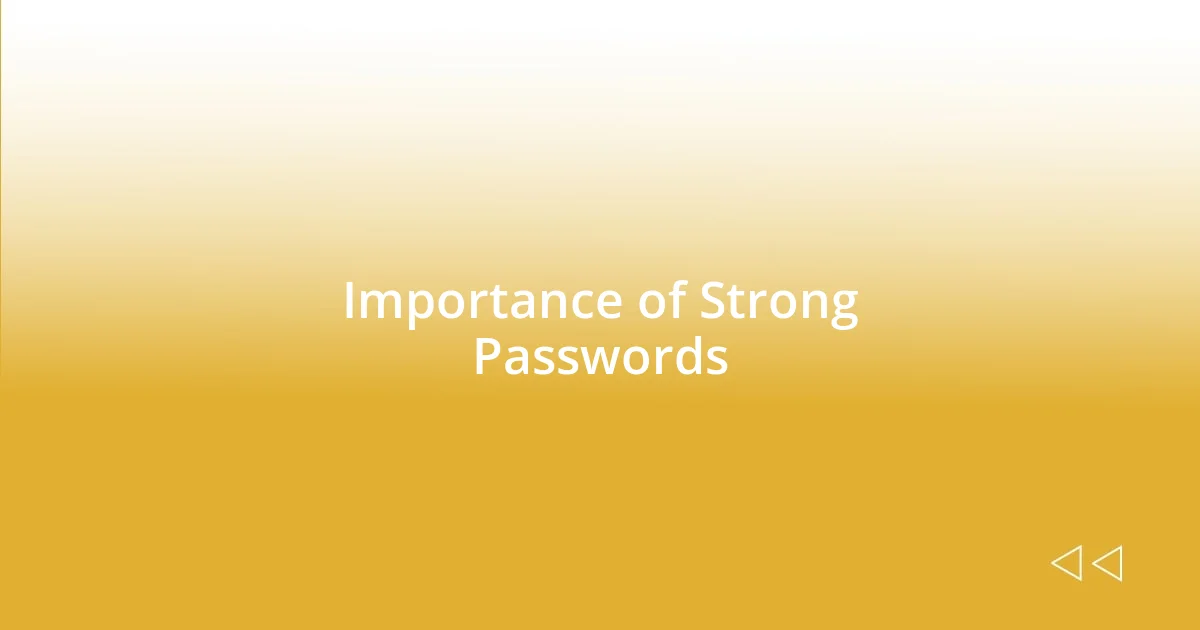
Importance of Strong Passwords
When I think about strong passwords, I can’t help but recall a time when I used a simple, easy-to-remember password for my online banking. One morning, I woke up to a notification that my account had been accessed from an unfamiliar location. The feeling of panic was overwhelming, making me realize how a weak password could unravel everything I held dear. Strong passwords act as the first line of defense, protecting our sensitive information from prying eyes.
Here are some key reasons why strong passwords are essential:
- Prevent Unauthorized Access: A strong password keeps your accounts secure, effectively shielding them from hackers.
- Limit Damage: If one account is compromised, a robust password can prevent the intruder from easily accessing your other accounts.
- Peace of Mind: Knowing that your passwords are strong allows you to use your devices and accounts without constant fear of being hacked.
- Protection Against Automated Attacks: Many cybercriminals use automated tools to crack passwords. A complex password can thwart these attacks.
The experience of strengthening my passwords has empowered me to feel in control of my digital life. By opting for complex phrases or mixing characters, I no longer dread the possibility of someone exploiting my information. The little effort it takes truly pays off in security and peace of mind.
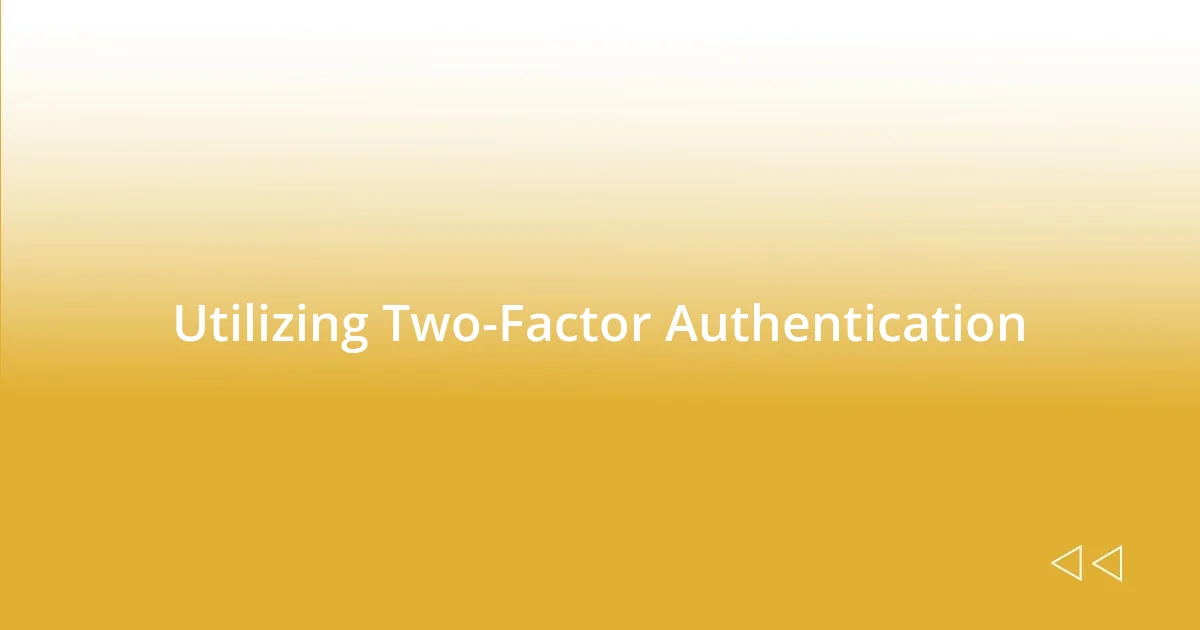
Utilizing Two-Factor Authentication
When I first implemented Two-Factor Authentication (2FA), I felt like I’d finally added a robust layer of security to my online accounts. Initially, it took some getting used to—inputting a code I received on my phone or using an authentication app felt like an extra task. However, the peace of mind that came with knowing even if someone obtained my password, they still couldn’t access my accounts was invaluable.
I’ve noticed that many people still overlook 2FA, thinking their passwords are enough. I can’t blame them; I used to think the same way. However, after hearing about a colleague who lost critical work data because their account was compromised, I realized the stakes are much higher than just being “careful” with passwords. It’s not just a precaution; it’s a critical step in safeguarding our digital lives. The sense of security I now feel has made the slight inconvenience of entering an additional code worth it every time.
To emphasize how different authentication methods stack up, here’s a comparison of popular 2FA options:
| Authentication Method | Security Level |
|---|---|
| SMS Code | Medium – Vulnerable to SIM swapping |
| Authenticator App (e.g., Google Authenticator) | High – Time-limited and device-specific |
| Biometric Authentication (e.g., Fingerprint) | Very High – Unique to individual |
| Hardware Token (e.g., YubiKey) | Very High – Physical security |
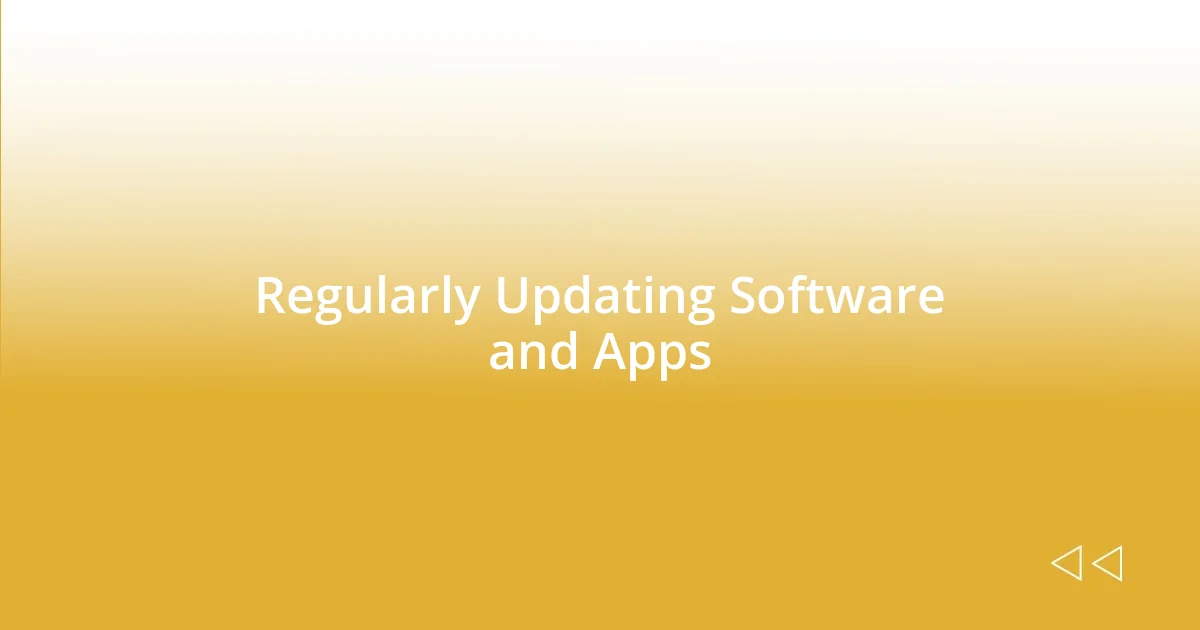
Regularly Updating Software and Apps
When I reflect on the importance of regularly updating software and apps, I can’t help but think of a time when I neglected this practice. I had a favorite app that suddenly started acting weird, crashing at the most inconvenient moments. It turned out that I had missed several critical updates, which not only enhanced the app’s functionality but also patched potential security vulnerabilities. That experience made it painfully clear how crucial updates are for keeping our devices secure and running smoothly.
There’s something almost cathartic about the update process. Each time I hit that “update now” button, it feels like I’m not just improving my device, but actively participating in my own security. I’ve learned to make this a routine in my digital life, much like taking the time to change air filters in my home. I often ask myself, “Why wouldn’t I want to safeguard my personal information with the latest protections?” The answer is simple: I wouldn’t want to risk the security of my data, especially when updates are often designed to counteract new threats.
Lastly, while automatic updates can be a life-saver, I make it a point to manually check for updates regularly as well. Once, after a family member’s device got infected due to outdated software, it made me realize how even small lapses can lead to major headaches. Taking just a few minutes to ensure everything is up-to-date makes a world of difference in the security landscape. It’s a small effort that pays off significantly in peace of mind.
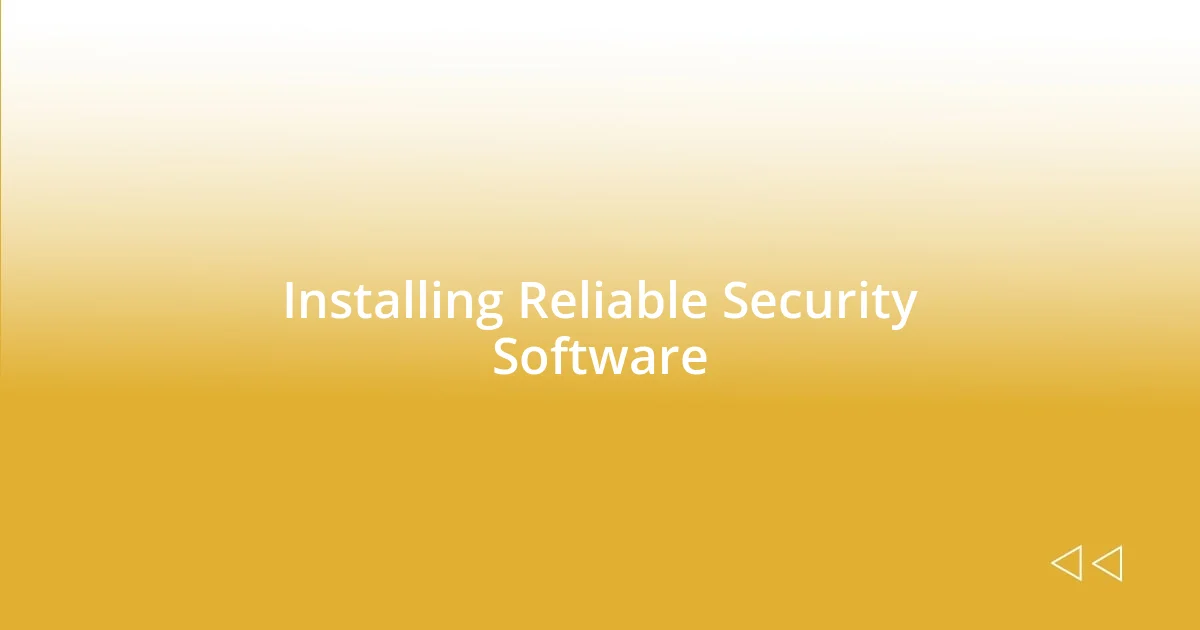
Installing Reliable Security Software
When I decided to install security software on my devices, I felt an immediate shift in how seriously I regarded my online safety. The first time a pop-up alerted me to a potential threat, I realized how valuable this software could be. It was like having a digital bodyguard watching over my information while I went about my daily tasks. Have you ever thought about how vulnerable you might be without that extra layer of protection?
Choosing the right security software is crucial, and I can’t stress this enough. My initial experience with a free version left me less than impressed—it felt inadequate when it came to real protection. After some research and personal recommendations, I upgraded to a reputable paid option, and it was a game changer. I noticed not only better performance but also a comprehensive set of features that offered proactive malware protection and web filtering. Isn’t it worth investing in something that directly safeguards our most sensitive information?
I also learned the importance of not just installing the software but regularly monitoring its performance. There was a moment when I thought everything was running smoothly, only to discover that I had a couple of unaddressed alerts waiting for my attention. It made my heart race to think about the potential risks I could have avoided. Now, I dedicate a few minutes each week to check the security dashboard—an easy habit that pays off in spades. It’s astonishing how a little vigilance can lead to significant peace of mind, don’t you think?
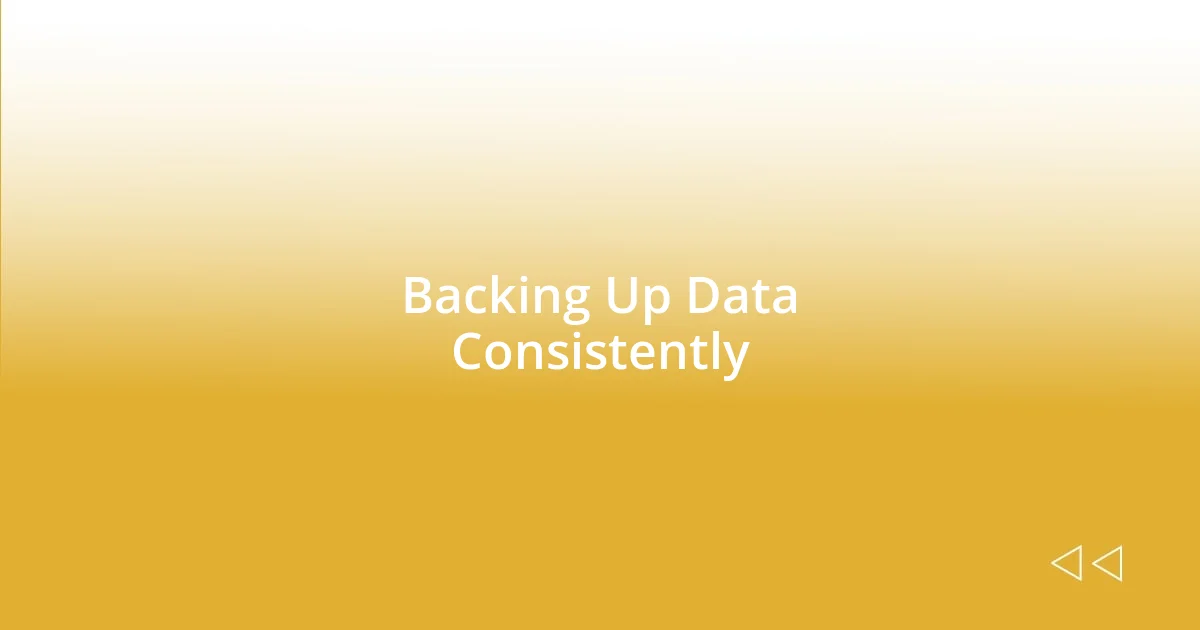
Backing Up Data Consistently
Backing up my data consistently has become an essential practice I prioritize in my tech-savvy life. I remember one instance when I lost a project that I had poured countless hours into, simply because I hadn’t backed it up. That moment was a wake-up call. From that day forward, I committed to a routine that ensures my important files are never at risk. Do you really want to face that gut-wrenching feeling of loss?
I’ve discovered that relatively simple methods can make a monumental difference. For instance, I utilize both cloud storage and external hard drives. This dual approach not only provides redundancy but also grants me peace of mind knowing that my data is safe in multiple places. I often find myself asking, “What would I do without those backups?” It’s comforting to know that if anything happens to my device, I won’t be starting from scratch.
Incorporating reminders into my schedule has been another game-changer. I set monthly alerts to review and backup my files, and it feels satisfying to check that off my list. I recall feeling a rush of confidence the first time I realized I hadn’t just saved my data but preserved my creativity and hard work. If you’re not doing this yet, I urge you to find a system that works for you. Remember, backup isn’t just a task; it’s a safeguard for your digital life.
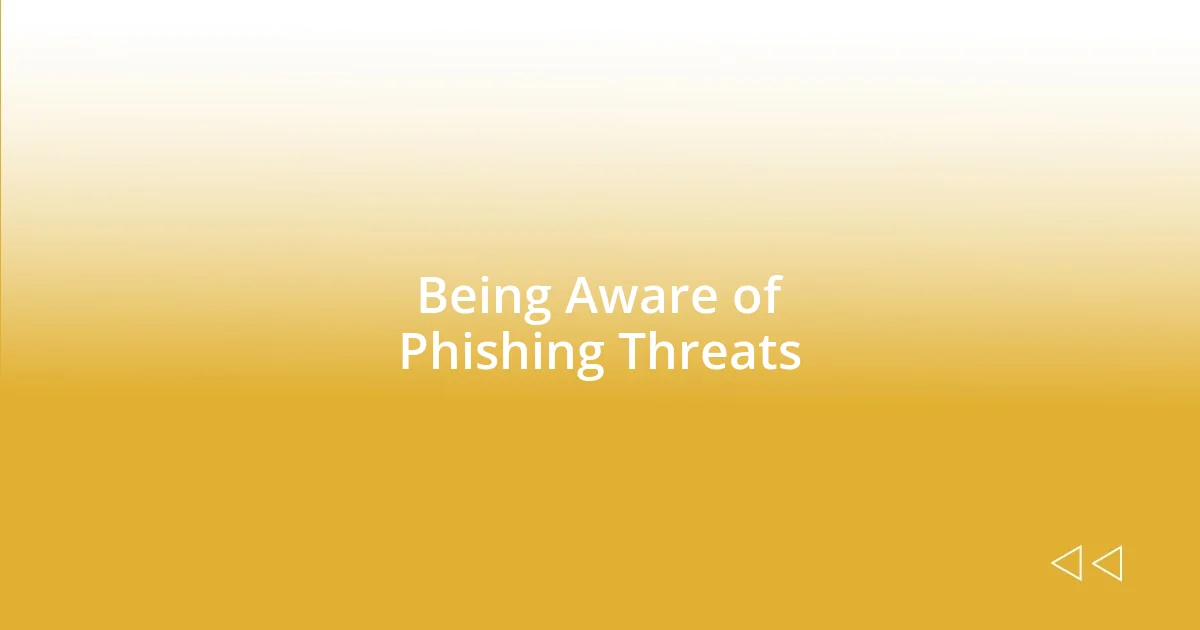
Being Aware of Phishing Threats
I’ve found that being aware of phishing threats is crucial in today’s digital landscape. I remember receiving an email that appeared to come from my bank, complete with their logo and everything. The urgency in the message made my heart race; they claimed my account would be frozen unless I clicked a link immediately. Thankfully, my instincts kicked in, and I decided to verify directly through the bank’s app instead. Do you know how easy it would have been to fall for that?
Every time I read about a successful phishing attack, I can’t help but think about how subtle these schemes can be. These attackers are masters at crafting messages that evoke emotions—fear, curiosity, or even excitement. In fact, I’ve had colleagues who almost clicked on fake job offers because they were so well written and enticing. It’s sobering to realize that their elaborate tactics could catch anyone off-guard, right?
Now, I make it a habit to hover over links before clicking, which reveals the real URL hidden behind the text. It’s a small action that brings me significant peace of mind. Nowadays, whenever I receive suspicious messages, I remind myself they’re fishing for a reaction, and I refuse to take the bait. Have you considered how often you think twice before engaging with unexpected communications? It’s about turning caution into a protective shield, and trust me, the habit will serve you well!



